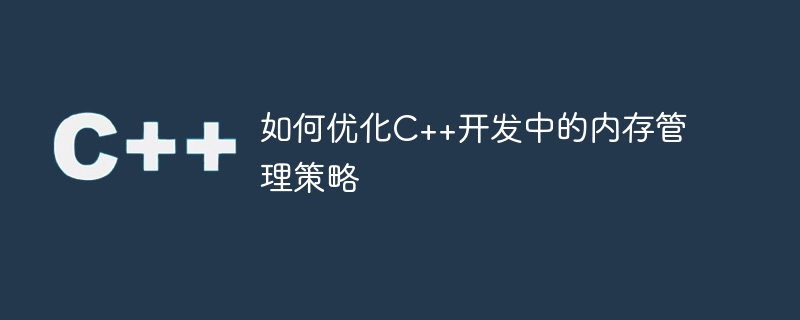Home >Backend Development >C++ >How to optimize memory management strategies in C++ development
How to optimize memory management strategies in C++ development
- WBOYWBOYWBOYWBOYWBOYWBOYWBOYWBOYWBOYWBOYWBOYWBOYWBOriginal
- 2023-08-22 11:00:211117browse

How to optimize the memory management strategy in C development
Overview
C is a powerful programming language, but also because of its underlying Features require developers to manage memory themselves. Proper memory management strategies are crucial to the performance and stability of C programs. This article will introduce some methods and techniques for optimizing memory management strategies in C development.
- Using smart pointers
C 11 introduces smart pointers, such as std::shared_ptr and std::unique_ptr, which can automatically manage memory and ensure that Automatically release resources when needed. Using smart pointers can avoid problems such as memory leaks and wild pointers, and can reduce the tedious operation of manually releasing memory.
- Avoid frequent dynamic memory allocation and release
Frequent dynamic memory allocation and release operations will cause memory fragmentation, thereby reducing program performance. An effective memory management strategy is to avoid frequent dynamic memory allocation and release operations. You can use an object pool or memory pool to pre-allocate a large block of memory, and then allocate objects from the memory pool when needed, which can improve the efficiency of memory allocation.
- Use RAII (resource acquisition is initialization) principle
RAII is an important programming principle in C, which refers to obtaining resources in the constructor of an object , releasing resources in the destructor. By using the RAII principle, you can ensure that resources can be released promptly after use, thereby avoiding the problem of resource leakage. For example, you can use the std::fstream class to manage file resources, use std::lock_guard to manage mutex lock resources, etc.
- Avoid dangling pointers and wild pointers
In C development, dangling pointers and wild pointers are very common problems. They can cause the program to crash or occur unexpectedly. mistake. When using pointers, be sure to ensure that the memory pointed to by the pointers is valid, and set the pointers to nullptr promptly when they are no longer used.
- Use the positioned new operator
The positioned new operator is an important memory management technology in C, which can create objects at specified memory locations. By using the positioned new operator, you can manage memory more flexibly and avoid unnecessary memory copies and dynamic memory allocation.
- Use appropriate data structures
Choosing appropriate data structures is also an important factor in optimizing memory management. Different data structures access and manage memory differently. For situations where frequent insertion and deletion operations are required, data structures such as linked lists or trees can be used. For situations where fast query operations are required, data structures such as hash tables or red-black trees can be used.
- Use memory analysis tools
Using memory analysis tools can help developers find and solve memory management problems. Commonly used memory analysis tools include Valgrind and Dr. Memory, which can detect memory leaks, access out-of-bounds and other issues, and give relevant reports and suggestions.
Conclusion
Optimizing the memory management strategy in C development is very important to improve the performance and stability of the program. By using smart pointers, avoiding frequent dynamic memory allocation and release, using RAII principles, avoiding dangling and wild pointers, using positioning new operators, using appropriate data structures and using memory analysis tools and other methods and techniques, we can be better Manage the memory of the C program to improve the performance and reliability of the program. At the same time, no matter which optimization method we use, we need to ensure readability and maintainability to avoid problems caused by over-optimization.
The above is the detailed content of How to optimize memory management strategies in C++ development. For more information, please follow other related articles on the PHP Chinese website!
Related articles
See more- C++ compilation error: A header file is referenced multiple times, how to solve it?
- C++ compilation error: wrong function parameters, how to fix it?
- C++ error: The constructor must be declared in the public area, how to deal with it?
- Process management and thread synchronization in C++
- How to deal with data splitting problems in C++ development

